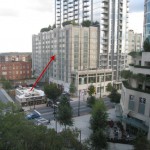Today, we are going to look at a very important piece of the real estate transaction. First, let me say, Once this series is completed (I think that is possible) I’ll have one post with a link to every topic for easy reference for you. I say that, because today’s topic is not in the order of the transaction per se, but it certainly is an important one.
Real Estate Terms to Know In Georgia | Seller’s Property Disclosure Statement
 This is an important piece of information we want to have when we are looking to make an offer on the home or condominium you are looking at. There are two different disclosure statements, one for single family homes and one for condominiums. They are relatively the same, but there certainly ARE differences between buying a home and a condo. For this series, we’ll focus on the Sellers’s Condominium Disclosure Statement.
This is an important piece of information we want to have when we are looking to make an offer on the home or condominium you are looking at. There are two different disclosure statements, one for single family homes and one for condominiums. They are relatively the same, but there certainly ARE differences between buying a home and a condo. For this series, we’ll focus on the Sellers’s Condominium Disclosure Statement.
In simple terms, this is the Seller’s “history” of the condominium since they have owned it. This disclosure tells you and me as the Buyer and the Broker important information about the property. A condominium disclosure has 16 sections as listed here:
- Occupancy
- Soil, Trees, Shrubs and Boundaries
- Roof, Gutters, and Downspouts
- Termites, Dry Rot, Pests and Wood-destroying Organisms
- Structural Items, Additions and Alterations
- Drainage, Flooding and Moisture
- Plumbing Related Items
- Other Systems and Components
- Toxic Substances
- Fees, Assessments and Property Management
- Parking and Storage
- Other Matters
- Fixtures/Items (what remains with the home and what goes)
- Lead-Based Paint (only a concern if the building was built prior to 1978)
- Agricultural Disclosure
- Additional Explanations
All of the above items need to be looked at by both you and I, but some are probably more important than others, depending on the Midtown Atlanta Condominium building that you buy in. Older, smaller communities or conversions (from apartments to condos) may have a higher degree of concern about termites than would a 36 story high rise!
Structural Items, Additions and Alterations
Key points here are: the year the unit (building) was constructed; if a conversion, when; and work done to the unit that was not permitted.
Drainage, Flooding and Moisture
Our concern here is if there has ever been any water leaks IN the specific unit you are looking to buy. Additionally, in the disclosure under Other Matters, we learn if there were repairs for any flood damage. Remember, it may have come from a unit above!
Other Systems and Components
Here is where we learn the age of two of the most important systems in a condo…the HVAC (heating/air conditioning) and the water heater. Both of these items can present costly repairs and their age help us determine if we will be looking for a home warranty, or close attention during any inspections.
Fees, Assessments and Property Management
Here we learn about any initiation fees or contributions to working capital fund and any pending or unpaid special assessments that may have been passed. Also what the monthly HOA fee is that covers the expenses paid by your homeowners association.
Parking and Storage
 While most Midtown Atlanta Condominium communities were built with “one parking space per bedroom” that is not always the case. One building was built in Midtown Atlanta and the developer mis-calculated the number of parking spaces, and there are two bedroom homes that only have ONE PARKING SPACE! (Tough re-sale issue!) You always want to know how many spaces you have, and where they are located in the garage. Also, this is a good time to ask about guest parking. (The arrow shows the garage portion of Viewpoint Midtown.)
While most Midtown Atlanta Condominium communities were built with “one parking space per bedroom” that is not always the case. One building was built in Midtown Atlanta and the developer mis-calculated the number of parking spaces, and there are two bedroom homes that only have ONE PARKING SPACE! (Tough re-sale issue!) You always want to know how many spaces you have, and where they are located in the garage. Also, this is a good time to ask about guest parking. (The arrow shows the garage portion of Viewpoint Midtown.)
Other Matters
A key point here is have any repairs been made to systems (HVAC, hot water heater) or the unit in general.
Fixtures/Items
You love that wine cooler in the kitchen? It might not stay with the unit. Like that light fixture in the Master Bath? Maybe it stays, maybe it goes. Here we learn what fixtures the Seller plans to leave and what they want to take with them. Sometimes, these items can be negotiated for purchase outside of the actual sales contract if you really want them.
Additional Explanations
When answering all the questions on the Disclosure Statement, the Seller answers, “Yes, No or Don’t Know.” Any “Yes” get’s explained here. If we have further questions, we can ask them of the Listing agent.
The Seller’s Property Disclosure Statement is a very important part of your purchase contract. You are acknowledging and so is the Seller of the history of the unit. Should there be mis-information on this statement, it can cause problems for someone down the road.
Here is the Seller’s Property Disclosure Statement (Condominium) if you would like to see the complete form.
